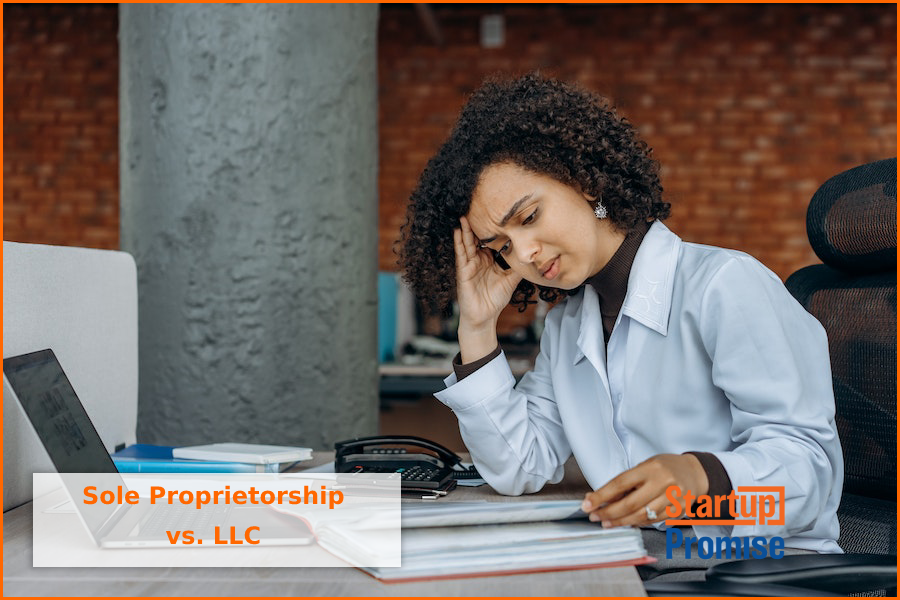- Startup vs Acquisition – Which is Best? - August 21, 2023
- How to Get Money to Start a Business - August 7, 2023
- How to Raise Capital to Start a Business - February 17, 2023
Understanding the differences between a sole proprietorship and an LLC (Limited Liability Company) is essential for any business owner – but especially important for a business owner trying to decide the best structure for their startup. Understanding the pros and cons of a sole proprietorship versus a Single Member LLC can be confusing, so we’ve created a simplified comparison in an effort to make it easy to decide which structure is best for your business.
Sole proprietorships and single-member LLCs are common options for solo entrepreneurs trying to determine the best way to structure their new business. A sole proprietorship is easy to get up and running and requires virtually no financial or structural documentation, but also offers no liability protection to its member, and may be difficult to fund. Conversely, single member LLCs require more structure, but also offer certain liability protections and increased business legitimacy.
Both options are fairly inexpensive and simple to start. Keep reading to learn more about the characteristics that make up each structure.

Do you have a question? Ask at the bottom of this post.
One of our advisors will answer!
Sole Proprietorship Schedule C
A sole proprietor has no formal business structure whatsoever. Any income earned or expenses paid by the sole proprietor are not separated from any other personal income the sole proprietor my earn, or pay in expenses. From a legal perspective the sole proprietorship is one and the same as the individual who operates the business.
Sole proprietors are generally required to report their business losses or profits on their personal tax returns, using Schedule C. The business owner is required to report the net profit or losses (by adding up company revenue and subtracting business expenses). Any loss being reported can be offset by other income on the owner’s tax return.
Keep in mind that some sole proprietors may report their profits or losses differently (like farmers, who use a Schedule F).
Disadvantages of Sole Proprietorship
There are some notable drawbacks to organizing your business as a sole proprietorship:
Unlimited liability: Unlike an LLC, your business doesn’t exist as a separate legal entity, and your personal wealth is at stake. This means that the owner is personally responsible for bad business debts and lawsuits. If the assets of a sole proprietorship fall short of satisfying debts or any other type of liability, creditors can go after the owner’s personal assets – including their bank accounts, homes, real property of any kind, automobiles, etc.
Lack of financial controls: No financial statements or meeting minutes are required of a sole proprietorship, which may result in lax financial and accounting control. Poorly managed finances can quickly escalate into a big problem.
Difficulty raising capital: Sole proprietorships require very little documentation (including financial statements and meeting minutes), making them a risky bet for any investor. Even if you are able to secure financing in the startup stages, be sure to think about the long-term implications of lax financial reporting, and the potential difficulty of securing additional financing in the future.
And last, but not least, selling a business to a new owner, when it has been operating as a sole proprietorship, is very difficult. Typically buyers want to review the business’ financial statements and perform due diligence. Doing so is nearly impossible because there is always a good chance a seller has excluded either income, (and more importantly) expenses and liabilities when reporting its profit/loss to the IRS.
Single Member LLC Definition
While sole proprietorships are easy and inexpensive to form, they don’t offer the limited liability or business legitimacy that an LLC does. A solo entrepreneur isn’t eligible to form a traditional (multi-member) LLC, but they can register as a single member LLC, which offers similar benefits.
A single member LLC is defined as a limited liability company that is owned by one member. A single member LLC must report its income and expenses with the IRS as either a sole proprietorship or as a corporation. If the member elects to file as a sole proprietorship, the business is disregarded for federal income tax purposes. This means that the member isn’t required to file a separate tax return for the LLC, but instead would report earnings and losses on their personal tax return on Schedule C.
Because single member LLCs are relatively easy to start and operate, they remain one of the most popular business structures for small business owners. To start a single member LLC, the member must simply draw up the formation articles, file with the secretary of state for the state where business will be conducted, and pay the necessary fee. In certain states, other steps may be necessary.
LLC Limited Liability
Likely the most important benefit of a single member LLC is that, in most cases, the LLC shields the individual member’s personal assets in the event the LLC cannot pay back debts or faces a lawsuit. Though the protection isn’t quite as robust as it is for a traditional LLC, the member still enjoys some protection under most circumstances.
Limited liability is based on the premise that the company and member are individual entities, but it’s very easy for a single member to blur the boundaries between personal and business affairs. In some cases, the court may overturn the member’s liability protection if these boundaries have not been maintained, holding the individual member liable.


Can you umbrella a sole proprietorship with a non-profit?
Hi Larrymi,
I assume you are using the term umbrella to mean a company to serve as a holding company of other business entities.
If so, the answer is no.
And that’s because a sole proprietorship is not an entity. It’s an individual who operates a business without forming a business entity.
Holding companies can’t own a sole proprietorship.
If this doesn’t answer your question, please let me know and I will try again…
I have 2 businesses candle and also a Tshirt with 2 different names. I want to do a LLC and get my state tax ID. Can I do it all in one but still use my separate names.
Hi Karri,
Yes, you can have the two existing DBAs as part of the new LLC. However, there are several steps to take to accomplish this.
If your two existing businesses have fictitious names and you want them to be part of your new LLC once its formed, you will need to terminate the fictitious named (DBAs) you filed for as an individual and then have the newly-formed LLC apply for them. Doing so will mean the LLC owns the rights to use these fictitious names.
Before doing so, I recommend researching whether you truly have the intellectual property rights to the tradenames. Even though you may have filed for DBAs and used them in your two businesses, doesn’t necessarily mean you have the legal rights to do so.
If all goes well and you’re confident your rights to the tradenames are available to you, you can use all three names — the name of your new LLC, as well as the two fictitious names (DBAs).
Hope this helps you Karri!
If I wanted to start a life coaching business and a small clothing line should I get a standard llc or a series llc?
Aleia:
Functionally, they are the same thing. Typically a series LLC is when you want to apply the same rules and operating documents to multiple entities that are similar. Imagine you own 20 rental houses and wanted to put them in LLCs. You could create a “series” LLC so that each entity works the same.
Many states do not recognize the “series” LLC.
Since you have two completely different businesses, a series LLC does not make much sense.
Good morning,
I am starting a small food business and am not sure how to proceed. I have received my fictitious name registration and I have an EIN number.
I was unable to open a business account due to the lack of a business name ,LLC.
I am the sole owner and would like help in finding out what steps to take next. I have my food manager certification for my state but need to know what I need to have to sell prep meals and hummus to clients.
Hello, Brian.
Congratulations on taking the big step to business ownership.
With your certificate from the state or county showing your Assumed Name plus your letter from the IRS showing the EIN registered to your name, you should be able to open a bank account. You do not need to have an LLC or corporation registered if you are doing business as a sole proprietor. If your bank does not let you open a business account without being an LLC, then please, ask why, or visit another bank!
As for what else you need to open your business really depends on your locale. If you have a physical location, you may need local operating permits, occupancy permit, etc. If you are selling prepared meals out of your home, you may need a local business license. Because laws vary from place to place, it is best to consult a local accountant or business advisor.
Another source of assistance would be your local SBA office (SBA.GOV for details).
Some places have more red tape than others, but that’s what keeps the amateurs out of your way! Good luck!
Holly, 1st of all, thanks for the great FREE info! A breath of fresh air!
Anyway, my wife and I are setting up a very small business retail. Local sq. ft rental space as well as potentially online sales.
We want to start out on the right footing for the future to have a business for us after retirement. As it will involve both of us and we file taxes jointly, what would you suggest we do regarding sole propitiatory vs. LLC and how would we do that to protect us both from tax liability as well as personal asset protections.
Hi J Mark,
Glad to assist you…
Regardless of the way in which you and your wife choose to form a business entity (or not) and elect to pay income taxes, there is no way to “protect (you and your wife) from tax liability”. This fact is very important to understand! If your business generates income or is required to collect sales or other types of taxes from your customers, you (and your wife) will be held personally liable for these taxes. It’s just the way it is.
There are certain personal liability protections that you will gain if you choose to form a business entity (LLC or incorporation — and a Limited Liability Partnership) for your business. If you go forward as a sole proprietorship, these personal liability protections will not be available to you.
Here’s a more comprehensive post on the various types of business entities you may want to consider and how they may be helpful to you in terms of personal liability protections.
Hope this helps you a bit…
Hi Holly, My name is Tim and I am wanted to open an auto mechanic and detail shop,would it be best to open as an DBA or LLC, and my concern is with my tax liability and the possibility of being sued which would protect my personal property and assets?
Hi Tim,
If you file as an individual for a fictitious name (or DBA), then you will be operating your business as a sole proprietor. This form of business ownership offers you zero personal liability protection.
LLCs, Corporations and Limited Partnerships offer you certain personal liability protections.
As for tax liabilities, there is no form of business ownership that will shield you or offer you personal protections if taxes owed are not paid.
Hope this helps a bit Tim…
Hi, Holly.
Is it possible that I start my business as a single member LLC then later change to a Partnership? If so, how do I do?
Thank you.
Hi Sunny,
When you form a single-member LLC, you have the option to elect its federal tax treatment. And one of the options it to treat the LLC for federal tax purposes as a partnership.
So converting the LLC to a Partnership may not be necessary at all.
Electing a federal tax treatment for your business entity is handled by filing federal form 8832.
To convert an LLC to a Partnership business entity, it would involve multiple steps and you’d need the assistance of your business attorney and CPA to accomplish it.
Hope this is helpful Sunny…
Hello, and thank you in advance for any guidance you can provide. I’d like to start a very, very small business, renting out some large marquee letters for use at events like wedding receptions. I’m planning to start with just one simple offering (“LOVE”) to see how it goes. There is no one in my locale offering these, so while I don’t expect to get rich from the venture, it may be a niche that allows for some additional income. Starting out, should I just begin as a sole proprietorship and see if it takes off? I have this fear in my my mind of burning down a venue and it being traced back to my letters! I don’t want to be sued!
Hi Gary,
Your concern about being held personally liable should something go wrong is valid.
We always recommend forming some type of business entity (LLC, Corp or Limited Partnership) and to purchase a business general liability insurance policy for the business to reduce such risks!
All the best to you in your new business venture…
Hi Holly,
I want to start an e-commerce business but I also have a caregiving agency. Can I put both under the same LLC umbrella and operate each under it’s own DBA keeping separate accounting, insurance, marketing, liability etc or should I separate them? If yes to keeping them under 1 LLC, can the LLC umbrella (LLC shops around for benefits then offer it to it’s DBAs) provide each DBA with benefits like medical insurance, workers compensation, HSA/Flexible Spending, etc? For e-commerce, if my 11 year old model clothes and shoes, etcl what is the maximum that I would need to pay her annually?
Hi Asipesionau,
The decision to add another line of business to your existing LLC business entity under a fictitious name depends on several factors.
You should carefully consider whether you want to co-mingle the business operations under one business entity. Doing so, means if one of the business operations were to be sued, the other business operation’s assets and income would be subject to the lawsuit.
When you have more than one business operation with controlled ownership (as you’ve described), regardless of how the business operations are legally formed, you may be required by law to provide the same employee benefits packages to all employees. This is something you should also carefully consider.
Your minor child who works for your business should be paid at least minimum wage in accordance with the child labor laws in your state.
All the best to you as you start up your new e-com business…
Thank you very much
It’s my pleasure!
Good morning. My name is Michael.
I am a hobby knifemaker and ornamental blacksmith. I am going to pursue my hobbies an income-producing business – I’ve purchased a building and am renovating it, am about to puchase some equipment etc… My question is, since I as the artist/smith am the only “employee”, would it be better for me to file an LLC or a DBA? I’m asking because I want to be able to file taxes, and deduct accordingly, next tax season, and right now don’t yet have a business account set up, so the ezpenses of setting up, purchasing equipment, etc… are coming “out of my pocket” as the saying goes. If I form an LLC will I still be able to deduct my business expenses from my personal taxes, or can I not because an LLC is a separate legal entity? Would it be best, in my case, to setup as a DBA and change to an LLC at a later date? I really appreciate your help. Have a great day!
Hi Michael,
If you form an LLC and you are a single member (no other members in your LLC), by default your business entity will be taxed exactly as if you were operating a sole proprietorship.
So this means any tax deductions you’d be entitled to as a sole proprietor would be available to you as a single member LLC.
I am not a fan of sole proprietorships because of the additional taxes and personal liability exposures. And because the formation of an LLC is not terribly difficult or expensive, you may want to consider this route.
All the best in your new business Michael… I am rooting for you!
Good morning, Holly. Thanks so much for answering my question. I’ll be setting up an LLC – sounds like a much better way to go. Hope you have a great day!